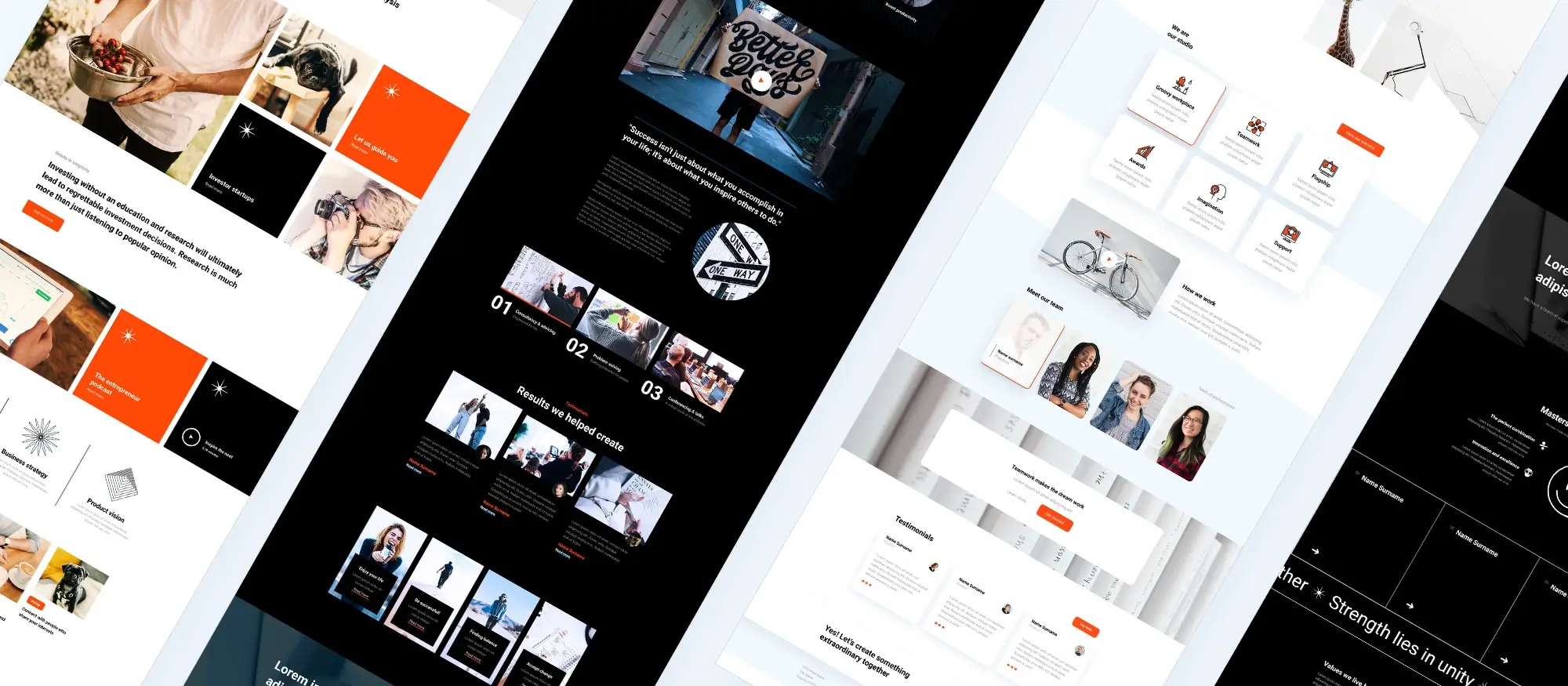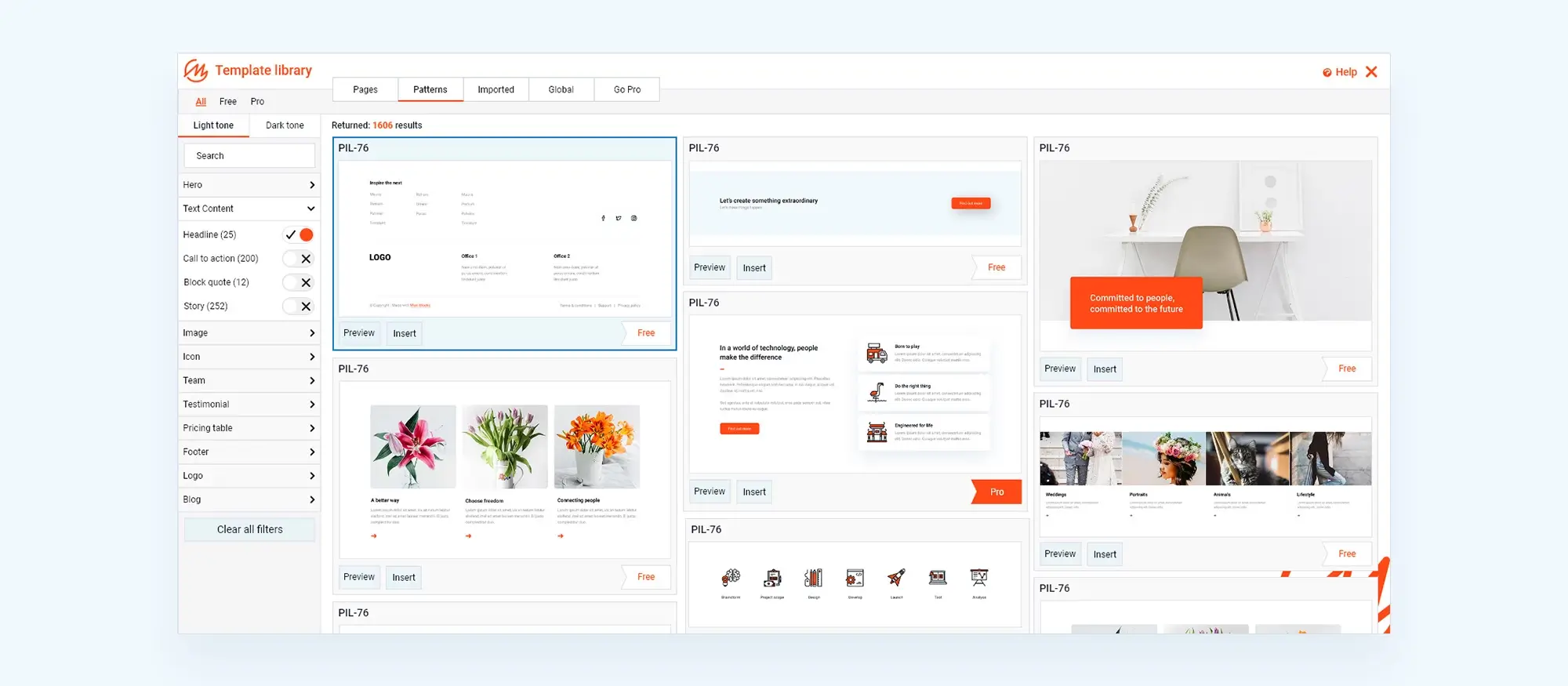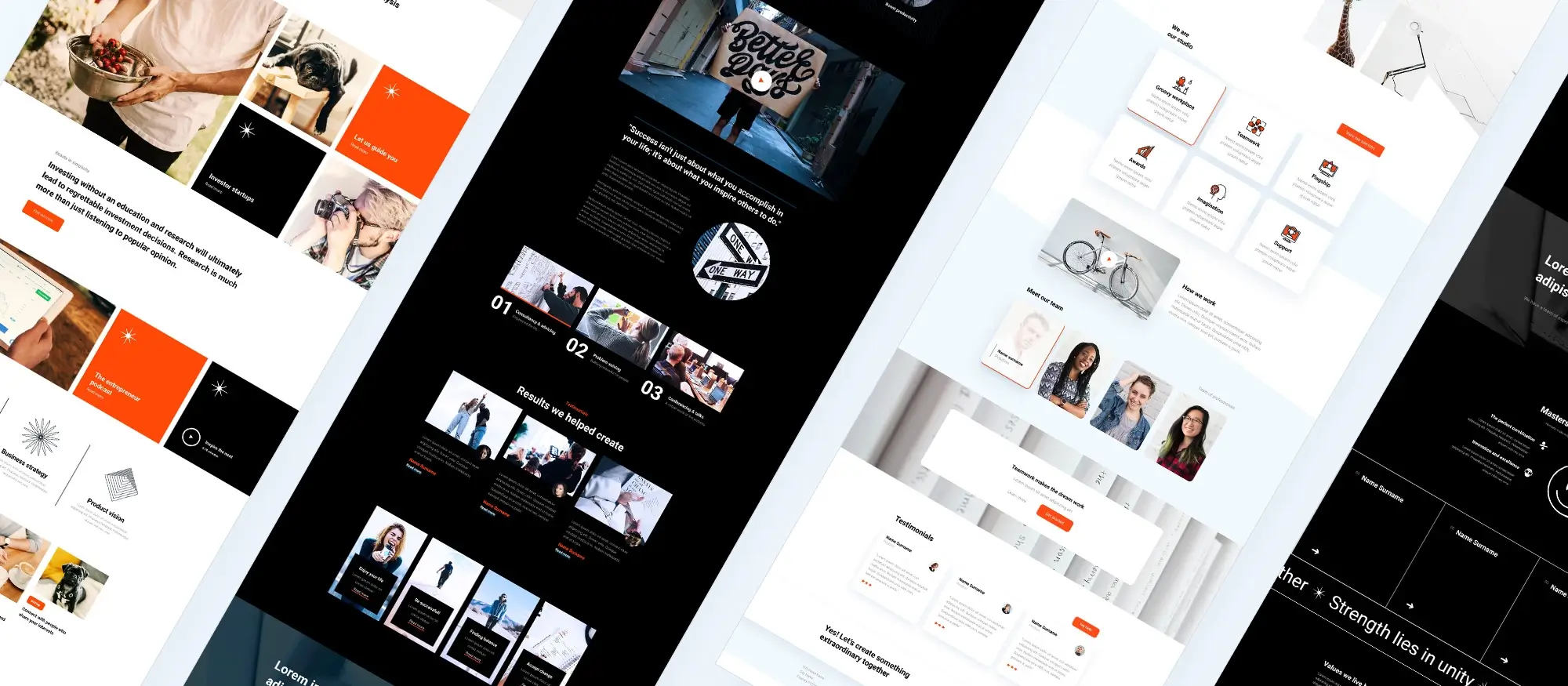How much does it cost to design a website on WordPress?
Try MaxiBlocks for free with 500+ library assets including basic templates. No account required. Free WordPress page builder, theme and updates included.

Updated 15th May 2025
Understanding the cost of designing a website on WordPress
Domain name
A domain name is your website’s address on the internet, and it’s essential for users to find and access your site. On average, purchasing a domain name costs between £10 and £15 per year. You can register your domain with providers like GoDaddy or Namecheap. Premium domain names with high demand keywords or short names may cost significantly more.
Tips and tricks
Look for promotions or first-year discounts when registering a domain. Some providers offer bundle deals with hosting. Opting for a longer registration term can also offer savings over time.
Do’s
Choose a domain that is short, easy to spell, and clearly represents your brand or business. Always research and compare domain registrars to ensure you get the best value and support.
Don’ts
Avoid obscure domain extensions unless they are part of your branding strategy. Be cautious of low initial prices that come with high renewal fees.
Pros
A custom domain name enhances your website’s professionalism and credibility.
Cons
Premium domain names can be very expensive, and renewal fees might be higher than your initial registration.
Hosting services
Web hosting makes your WordPress website accessible online. The type of hosting you choose will significantly affect both the performance and cost of your site. Common options include shared hosting, VPS (Virtual Private Server), dedicated hosting, and managed WordPress hosting.
- Shared hosting is the most affordable, starting at around £3/month.
- VPS hosting offers more resources and flexibility, typically starting around £20/month.
- Dedicated hosting provides full control and top performance, costing upwards of £80/month.
- Managed WordPress hosting includes WordPress-specific optimisations and support, usually ranging from £20 to £50/month.
Tips and tricks
Take advantage of introductory offers or bundle deals with domains. Review the provider’s performance metrics like uptime and speed, and test their support responsiveness before committing.
Do’s
Select a hosting plan that aligns with your current needs and potential future growth. Prioritise hosting companies with a reputation for good performance and security.
Don’ts
Don’t automatically choose the cheapest hosting option without checking performance reviews. Avoid hosting plans with limited scalability if you expect traffic growth.
Pros
A good hosting provider improves your site’s speed, reliability, and security, which is essential for user experience and SEO.
Cons
Premium hosting services can become expensive, especially as your site grows or requires advanced features.

Understanding the cost of designing a WordPress website
WordPress themes
Choosing between free, premium, and custom themes
Themes control how your website looks and feels. You can find free themes on WordPress.org, while premium themes from marketplaces like ThemeForest or Elegant Themes generally cost between £30 and £70. If you want a custom-designed theme, be prepared to spend anywhere from £500 to several thousand pounds depending on complexity.
Tips and tricks
Test free themes before investing in a premium one. Look for themes with a money-back guarantee and active support forums.
Do’s
Select a theme that is mobile-friendly, responsive, and regularly updated. Ensure it aligns with your brand and supports customisation.
Don’ts
Avoid themes with outdated code or no recent updates. Don’t choose a theme solely based on aesthetics without considering functionality.
Pros
Premium themes usually offer more built-in features, flexibility, and customer support.
Cons
Custom themes can be expensive and time-consuming to develop. Free themes may lack essential functionality or timely updates.
WordPress plugins
Enhancing functionality with plugins
Plugins allow you to add features like SEO tools, e-commerce options, and contact forms. While many are free, premium plugins can range from £20 to £100. Custom plugins can cost much more depending on development time and scope.
Tips and tricks
Stick to plugins that serve a clear purpose. Review them regularly and remove those you don’t use.
Do’s
Install plugins from reputable sources with good reviews and regular updates. Keep them up to date to prevent vulnerabilities.
Don’ts
Don’t overload your site with unnecessary plugins. Avoid using plugins that are not compatible with your WordPress version.
Pros
Plugins offer powerful enhancements without requiring custom code. Most can be installed and configured with just a few clicks.
Cons
Too many plugins can slow your site or create conflicts. Some premium plugins require ongoing license fees.
Let me know if you’d like me to continue this format for domain names, hosting services, or any other section.
Subscribe to our newsletter
The true cost of website design and customisation on WordPress
Website design and customisation
Exploring design options and pricing
Hiring a web designer or developer can significantly affect your budget. Freelancers typically charge between £20 and £100 per hour, while agencies may charge from £50 to £200 per hour. For those choosing the DIY route, premium page builders like Elementor or Beaver Builder range from £40 to £100 for a license.
Tips and tricks
Use page builders to streamline the design process without writing code. Always get quotes from multiple professionals to evaluate the best value for your budget.
Do’s
Assess your time and skill level honestly before deciding to hire help or customise your site yourself. If you plan to make frequent updates, a premium page builder can offer flexibility and ease.
Don’ts
Don’t choose the cheapest option without reviewing the designer’s portfolio. Also, don’t sacrifice usability or accessibility in favour of flashy visuals.
Pros
Professional design enhances your site’s appearance and user experience, helping you stand out in a competitive online space.
Cons
The cost of hiring experts can add up quickly, and DIY tools may require a learning curve.

E-commerce and maintenance costs in WordPress website development
E-commerce functionality
Understanding the investment
Setting up an online store with WordPress typically involves extra expenses. While WooCommerce the most popular e-commerce plugin is free, many of its essential extensions can cost between £30 and £200. Additionally, payment gateway fees and other transaction-related charges should be factored into your budget.
Tips and tricks
Begin with the most essential e-commerce features and add more over time. Compare payment gateways to find the most cost-effective solution for your business model.
Do’s
Explore different e-commerce plugins and ensure they align with your sales strategy. Always include transaction fees when determining your pricing.
Don’ts
Don’t overlook the importance of an SSL certificate for secure transactions. Avoid launching your store without thoroughly testing the checkout experience.
Pros
Adding e-commerce functionality opens up new revenue streams and can significantly grow your business.
Cons
The cumulative cost of extensions, transaction fees, and other tools can increase quickly.
Maintenance and support
Planning for sustainability
Maintaining your WordPress website requires consistent updates, security checks, and backups. Premium maintenance and support services often range between £10 and £50 per month, and budgeting for unexpected issues is highly recommended.
Tips and tricks
Automate routine maintenance where possible, including scheduled backups. Stay ahead by planning a regular update schedule.
Do’s
Back up your site before making major changes. Invest in reputable security plugins to protect your site’s integrity.
Don’ts
Don’t delay updates for WordPress, themes, or plugins. Don’t underestimate the value of responsive support, especially if you’re not technically inclined.
Pros
Ongoing maintenance ensures site stability, faster performance, and better security.
Cons
It requires time, attention, and possibly recurring financial investment.
Build like a pro
Optional and ongoing costs of running a WordPress website
Optional costs
Additional investments to consider
Beyond basic setup, you may incur optional costs for marketing, SEO services, professional content creation, stock media, and email marketing tools. These services can range from £50 to several hundred pounds monthly, depending on the tools and providers you choose.
Tips and tricks
Begin with free tools like Google Search Console or Mailchimp’s free tier, and upgrade as your site grows. Use websites like Unsplash or Pexels for quality free images before purchasing premium visuals.
Do’s
Hire professional writers or marketers if your content is central to your brand. Use targeted email campaigns to build relationships with your audience and increase engagement.
Don’ts
Avoid neglecting the value of polished content and consistent branding. Don’t use low-resolution or generic images that can weaken your site’s appeal.
Pros
Strategic investments in content and marketing can greatly improve traffic, credibility, and conversions.
Cons
These costs can accumulate over time, potentially exceeding your budget if not managed wisely.
Budgeting tips
Planning your spending
To keep your website financially sustainable, prioritise essential elements like hosting, security, and backups first. Allocate budget to optional services based on their return on investment.
Tips and tricks
Create a clear budget plan before starting your project. Consider bundles or platforms that offer integrated services at a lower rate.
Do’s
Focus your spending on foundational tools and services that support your site’s functionality and security. Revisit your budget monthly to track and adjust expenses.
Don’ts
Don’t invest heavily in extras at the beginning. Avoid ignoring hidden renewal fees and future upgrades that may stretch your finances later.
Pros
Good budgeting keeps your project on track and avoids unnecessary financial strain.
Cons
Unexpected costs may still arise, requiring you to reallocate or increase your budget.

Final thoughts on building your WordPress website
Creating a WordPress website is a smart move for anyone looking to establish an online presence whether you’re a blogger, small business owner, or creative professional. With the right tools, planning, and support, you can build a site that’s both functional and visually appealing without needing to code.
One of the most important takeaways is to focus on the essentials: a reliable domain and hosting provider, a responsive and professional theme, essential plugins for SEO, performance, and security, and a solid plan for maintaining and promoting your site. Take time to understand your audience and tailor your design and content to meet their needs.
And if you’re looking for an intuitive way to bring your ideas to life, the MaxiBlocks plugin is an excellent addition to your toolkit. It gives you creative control with zero fuss perfect for beginners and pros alike. Pair it with the MaxiBlocks Go theme for seamless performance and a beautifully cohesive design experience.
Start with a vision, use the right tools, and build something great. Your website is just the beginning now it’s time to make it truly yours.
Explore how to create a powerful WordPress website
Learn how to design, build, and optimize your WordPress website from start to finish.
FAQs – Website on WordPress
How much does it cost to design a website on WordPress?
The cost to design a WordPress website depends on factors like your domain name, hosting provider, theme choice, required plugins, the extent of design or custom development, e-commerce features, and ongoing maintenance. Total costs can range from as little as £50 for a basic site to thousands of pounds for a fully customised professional setup.
What is the cost of a domain name for a WordPress website?
A standard domain name typically costs between £10 and £15 per year. If you’re after a premium domain name (short, brandable, or keyword-rich), expect to pay considerably more. Also note that renewal fees may be higher than the initial registration.
How much does web hosting cost for a WordPress website?
Web hosting costs vary by type. Shared hosting starts around £3 per month and is ideal for beginners. VPS hosting typically costs £20 per month, while dedicated hosting can exceed £80 per month. Managed WordPress hosting, which offers performance and security benefits, generally ranges from £20 to £50 per month.
Are there free themes available for WordPress?
Yes, the WordPress Theme Directory offers hundreds of free themes. These are great for getting started, but premium themes priced between £30 and £70 often come with more features, flexibility, and support. Custom-designed themes can cost anywhere from £500 to several thousand pounds.
How much do plugins cost on WordPress?
Many essential plugins are available for free. However, premium plugins (for SEO, security, backups, forms, and e-commerce) generally range from £20 to £100 each. If you need a custom plugin developed, costs can be significantly higher based on complexity.
How much does it cost to hire a designer or developer for WordPress?
Freelance designers usually charge between £20 and £100 per hour, while web design agencies may charge £50 to £200 per hour. Alternatively, you can use premium page builders like Elementor or Beaver Builder for around £40 to £100 if you prefer a DIY approach.
What are the extra costs for setting up an online store with WordPress?
WooCommerce itself is free, but extensions for payment gateways, shipping, subscriptions, or advanced analytics can cost between £30 and £200 each. You’ll also need to account for ongoing payment processing fees.
How much does WordPress website maintenance cost?
Basic maintenance including updates, security checks, and backups can cost between £10 and £50 per month if outsourced. This ensures your site runs smoothly and stays secure.
Are there optional costs when designing a WordPress website?
Yes. Optional services include SEO and marketing, content writing, premium media, stock photography, and email marketing tools. These can add £50 to several hundred pounds to your monthly or project budget depending on your needs.
What are some tips for budgeting a WordPress website?
To stay within budget, prioritise essential features like secure hosting and basic plugins. Consider bundling services, use free tools where possible, and avoid unnecessary upgrades early on. Plan ahead for long-term growth and recurring costs.
Should I use a free or premium theme for WordPress?
Free themes are a good option for tight budgets and simple projects, but they can be limited in design and support. Premium themes offer more polish, better functionality, and regular updates but they come with a cost. Choose based on your website goals and technical comfort.
What is WordPress and why use it?
If you’re considering building a website, WordPress is likely one of the first platforms you’ll come across. These FAQs explain what WordPress is, what it can do, and why it remains one of the most trusted website builders worldwide.
What is WordPress?
WordPress is a content management system (CMS) that allows anyone to create and manage websites, from personal blogs to full e-commerce platforms. If you’re new to the concept, this guide to what WordPress is explains it clearly for beginners.
What makes a site a “WordPress website”?
A WordPress website is one that runs on the WordPress platform, meaning it uses WordPress software to manage its content, design and features. To understand how it all fits together, visit this explanation of what a WordPress website is.
How does WordPress work as a CMS?
As a CMS, WordPress allows you to publish content, customise your site, and install plugins without needing technical knowledge. This article on WordPress as a content management system outlines its key advantages for content creation and site management.
Why is WordPress such a popular website platform?
WordPress remains a top choice for its flexibility, ease of use, and vast customisation options. Learn more in this overview of why WordPress is a leading website builder.
Building and designing a WordPress website
Designing a website involves more than just choosing colours. This section focuses on the steps, tools and techniques for building a functional and well-designed site using WordPress.
How do I design a WordPress website?
The process involves choosing a theme, setting up pages, and using tools to customise your layout. This step-by-step guide to designing a WordPress website walks you through the entire process.
Where should I begin if I’ve never designed a website before?
If you’re completely new, this beginner’s guide to WordPress website design is a great place to start. It covers the core principles of layout, content, and user experience.
What is the best way to build a WordPress website?
Whether you’re using a page builder or a classic editor, this practical guide to building a WordPress site shows you how to take your site from idea to launch.
Can I build a website on WordPress myself?
Yes. With user-friendly tools and countless tutorials, this article on building a website with WordPress shows you how to do it without needing to hire a developer.
What’s the difference between building and making a WordPress site?
They’re often used interchangeably, but “building” typically includes setting up infrastructure like hosting and domains, while “making” often refers to design. This guide on how to make a WordPress website focuses on the visual and functional aspects.
How do I start my first WordPress site?
From choosing a domain to installing your first theme, this walkthrough on starting a WordPress website covers the basics clearly.
What if I need more advanced features or custom functions?
For more complex websites, WordPress website development allows for custom coding, integrations and deeper control.
WordPress customisation, features and tutorials
After setup, the real fun begins. This section helps you unlock the full power of WordPress through themes, tutorials and creative customisation.
How can I customise a WordPress theme?
You can change colours, fonts, layouts and more using the built-in Customiser or page builders. This WordPress theme customisation guide walks you through the process.
Where can I find helpful WordPress tutorials?
If you’re keen to learn more, the WordPress tutorials section on Maxiblocks covers everything from beginner tips to advanced techniques.
What is Gutenberg and how does it work?
Gutenberg is the block editor that allows for visual page building. For a hands-on overview, check out this Gutenberg tutorial, or explore the Gutenberg wiki for advanced users.
What should I do when something goes wrong?
Errors happen, but most are easily fixed. This WordPress debugging and troubleshooting guide helps you solve common issues quickly.
What are some creative ways to use WordPress?
You’re not limited to basic websites. These fun ideas for WordPress sites include everything from online magazines to digital portfolios.
WordPress costs and value
Understanding the costs behind WordPress will help you budget and plan for success. Here’s what you should know.
How much does it cost to design a WordPress site?
It depends on your goals. Simple websites may cost very little, while custom-built ones can be more expensive. This WordPress design cost guide explains the key price factors.
Can I build a WordPress website on a budget?
Yes, you can launch a site affordably using free themes and budget hosting. This article on low-cost WordPress design shares helpful strategies.
What ongoing costs should I expect?
Recurring costs like hosting, plugin subscriptions and backups are common. For full clarity, read this breakdown of WordPress website costs.
Is WordPress a good investment for long-term growth?
Absolutely. This benefits guide outlines why WordPress continues to be one of the most powerful and flexible platforms available.
WordPress popularity and reputation
Still wondering whether WordPress is the right platform in 2025? These questions explore how it holds up today and who’s still using it.
Which major sites use WordPress?
Plenty of high-profile brands rely on WordPress, including news organisations and global companies. For real examples, browse these famous WordPress websites.
Is WordPress still relevant today?
Yes. WordPress powers over 40% of the web and continues to evolve. If you’re unsure whether it’s still a good choice, this article on WordPress’s current use offers valuable insight.
WordPress itself
Official Website
wordpress.org – This is the official website for WordPress, where you can download the software, find documentation, and learn more about using it.
WordPress Codex
codex.wordpress.org/Main_Page – This is a comprehensive documentation resource for WordPress, covering everything from installation and configuration to specific functionality and troubleshooting.
WordPress Theme Directory
wordpress.org/themes – The official WordPress theme directory is a great place to find free and premium WordPress themes. You can browse themes by category, feature, and popularity.
maxiblocks.com/go/help-desk
maxiblocks.com/pro-library
www.youtube.com/@maxiblocks
twitter.com/maxiblocks
linkedin.com/company/maxi-blocks
github.com/orgs/maxi-blocks
wordpress.org/plugins/maxi-blocks

Kyra Pieterse
Author
Kyra is the co-founder and creative lead of MaxiBlocks, an open-source page builder for WordPress Gutenberg.
You may also like

